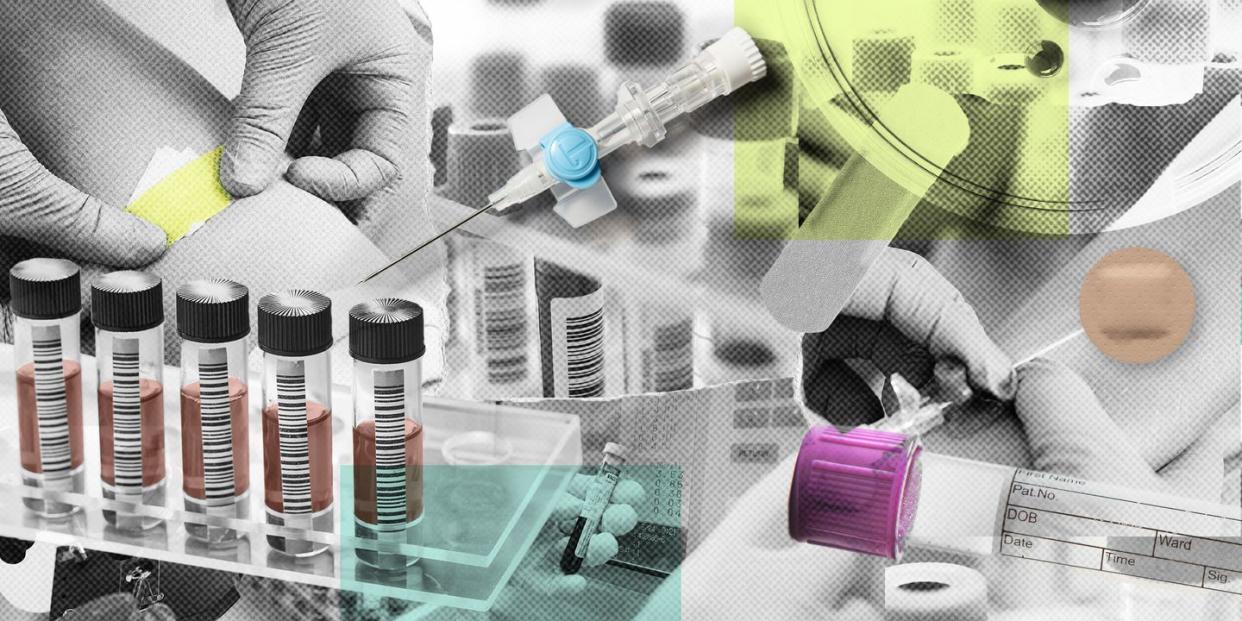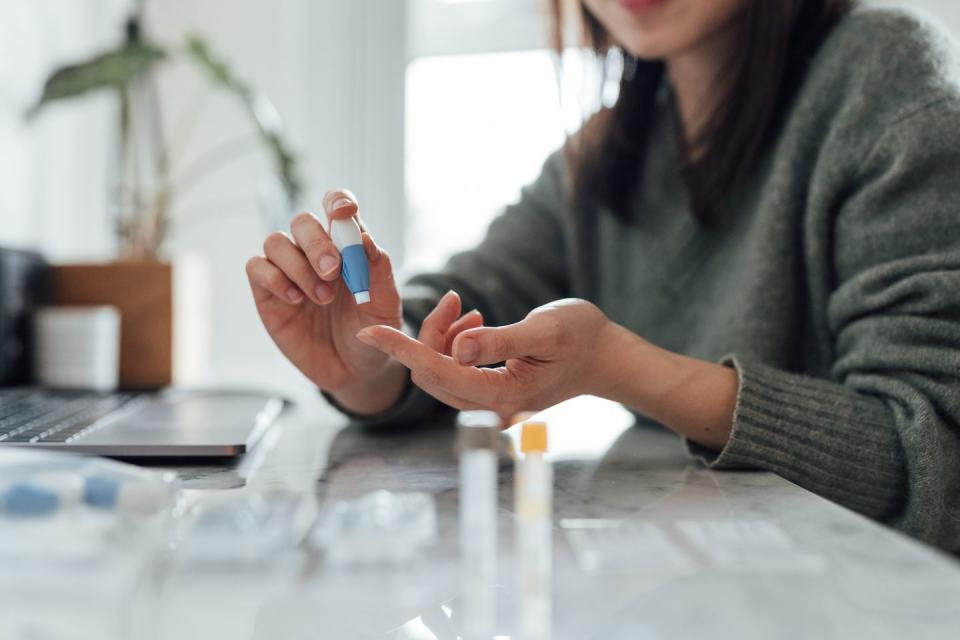'Private healthcare is seeing a boom among the anxious: I am one of them'

Biting my lip, I stare dead ahead at a blank wall as the needle makes its way through my skin. The 'sharp scratch' is over in seconds, and despite it not exactly being pleasant, the sensation is welcome: it's my key to much-wanted answers...
We've all seen the placards and read the headlines – it’s no secret the NHS is struggling right now. Long wait times are leaving worried patients sometimes fretting for weeks before managing to score a nine-minute chat with an overworked GP or waiting years for treatments. Services, like GP-ordered diagnostic tests, are being limited left and right, too. But when you're concerned about your health, waiting a week can feel like a thousand years – especially if you suffer from health anxiety like I do – which is likely why record numbers of us are now turning to private healthcare, in various forms, including blood tests.
Despite the current and brutal cost of living crisis, it seems many of us have decided that our health is still worth spending money on – or, like me in the past, worth rinsing an overdraft to tend to. New figures show 41% of 18 to 24-year-olds have used private healthcare, and further stats reveal 46% of people are running into debt or have had to cut back in other areas of their life to afford private healthcare, a trend that’s been branded as “shameful” by campaign group Keep Our NHS Public, which argues this shouldn’t be necessary given the NHS is taxpayer-funded. Perhaps this is why we’re also simultaneously witnessing a 783% rise in women’s wellness products (prevention over cure, anyone?) and an explosion of non-NHS affiliated kits and clinics (many former Covid testing sites) offering ‘quick and affordable’ blood tests, from as little as £20, knowing there’s a newly-health conscious audience ripe for the post-pandemic picking.
It seems we’re all keener than ever to know exactlywhat’s going on with our insides, be it by deep diving into our diets and gut health through ZOE or Myota, or by checking in with our fertility levels via Gripp or Hertility, or unearthing our genetic risk of contracting certain diseases, thanks to 23 and Me. All of the major health stores, such as Holland & Barrett, Boots and Superdrug have gotten in on the act too, now offering customers everything from vitamin deficiency blood tests to bowel cancer checks (be it through an in-store clinic or a box off the shelf). But are all these non-NHS blood tests and clinics really to be trusted? And does untapped access to knowledge always equal power? As someone with deeply entrenched hypochondria, I set out to learn more.

Can you trust a private blood test?
I’m sat in the office of Sue Porter (MSc RSFPH), founder of the Wellbeing Clinic in Essex, a private healthcare company, getting bloods taken for a ‘full-body MOT’ (known as a ‘women’s wellness check’, costing £200 – with that figure more than doubling in some London clinics). Full disclaimer: I was offered the test for free on this occasion as part of this article (after initially approaching Porter and asking to pay full price) and have paid for others at the clinic in the past.
It examines everything from vitamin levels to cholesterol and hormone health, and pretty much anything else you can think of. This uprise in private testing options massively appeals to me; some years back, my health anxiety grew so bad it encroached on my ability to work and left me bedbound, fending off panic attacks and stress-induced migraines.
The stress was so bad that at one point, the right-hand side of my body went entirely numb and it was only after extending my overdraft and spending close to £500 on private testing – all of which confirmed my problems were psychological, not physical – that I felt I could breathe again. Having results in black and white saying ‘you’re fine’ was the antidote I needed. So, having the option of sending all my key health markers off for review by Porter’s clinic, which works with the London Medical Laboratory, and a debrief with her afterwards, is ideal. Although it’s not cheap, the reassurance comes in at far less than I spent previously, and crucially, it’s far quicker too.
“Access to private blood tests, either through a clinic or at-home kits, can, in some cases, be a helpful resource for those struggling with health anxiety,” agrees Dr Elena Touroni, a consultant psychologist and co-founder of The Chelsea Psychology Clinic. “The immediacy of the results from private clinics contrasts with the prolonged wait times someone might experience in the NHS. This can swiftly alleviate any anxiety and provide reassurance, fostering a sense of control.”
Since setting up shop four years ago, Porter (who is not a doctor but rather a Masters level physiologist and Fellow in Public Health England) says she’s seen a real rise in the number of women asking for female hormone tests, vitamin deficiency checks and to have general ‘well woman’ bloods done like me, especially for those with vague symptoms, like tiredness. “People really just want to know there’s nothing wrong with them, we all have a niggling voice of concern. And if people can’t pinpoint a problem or have a common symptom, like low energy, a GP is likely to only test for one thing at a time,” she says.
Other areas of concern that Porter has seen an increase in include cancers. “There are a lot of requests for ovarian and bowel cancer risks, both of which are on the rise and have common symptoms like bloating,” she observes, caveating that these cancers are still rare (there’s a 1 in 78 chance of a woman having ovarian cancer in her lifetime, and a 5% chance of bowel cancer; the risk for both also increases with age), and bloating is linked to many other less worrisome conditions.
Our culture and attitude towards healthcare in general is shifting too, Porter adds. “Historically, it’s been very much along the lines of ‘if I need something, my doctor will give it to me’ but now people are realising there's not a bottomless pit of money in the NHS. They’re recognising they need to actively discover their numbers and risk factors, so they can make lifestyle changes early on, and there’s a real desire to invest in private tests so that people can go to their GP, armed with information, and say, ‘Look, this is what's wrong with me’.” She adds that she spends a lot of her time writing to her clients’ doctors (with their consent), highlighting concerns that tests have picked up “which they can then act on.”
Speaking about this shift in mindsets and rise of private options, an NHS spokesperson told Cosmopolitan UK that “it’s crucial that blood tests are done by qualified experts who are accurately able to spot issues and act in the best interest of patients” and added that the NHS “encourages anyone worried about their health to come forward and speak with their GP practice if something doesn’t feel right.”
How to know which clinics and kits are reliable
Whilst my test with the Wellbeing Clinic revealed nothing of concern (bar low Vitamin D levels, which many people living in grey weather countries have, and slightly high cholesterol), there is always the chance of getting seriously worrying news back – or even an entirely inaccurate result, says Dr Jeremy Harris. His experience of working as a GP within both the NHS and private practice settings, and as Senior Partner at The Private GP Group, has left him with concerns about the fallibility of self-testing kits and non-reputable independent clinics in particular.
Whilst reputable non-NHS affiliated companies, like the one Porter runs, can hopefully ensure that an adequate blood sample is taken, there’s always the risk of that failing when it comes to self-test kits, he explains. Not being able to collect a big enough sample (a problem that can occur with at-home finger prick tests) means a test will be rejected or have to be repeated. Though he concedes that some kits can be good for simple things such as cholesterol levels, vitamin deficiencies, allergy testing or a general health check. “But nothing can replace a doctor’s appointment; a medical practitioner may request very different tests to the restricted range of home tests that are available.” They’ll also have your medical history and be able to look at your situation holistically.

The legitimacy of the lab associated with a private clinic or DIY kit is another key thing to look out for, Dr Harris advises. “Make sure you choose a test kit that has undergone external testing,” he says. “Data should be published by the company which shows reliability and that they are safe and accurate to use. They should also be approved by the regulatory body – Medicines and Healthcare products Regulatory Agency (MHRA) – in the UK.
“As a patient, you also want to ensure any blood samples you’re providing will be analysed in recognised laboratories, meaning, a lab that is UKAS registered (the required national accreditation and observer of lab quality).” Porter is in firm agreement, adding: “There's no way that any doctor with an ounce of credibility would look at results from a non-UKAS accredited lab and say, ‘I'm going to prescribe you or diagnose you based on these’.”
Using a private test company that offers strong customer support (check out TrustPilot for reviews), in case of any issues or concerns, and looking for information on the kit or clinic's website about the test's performance characteristics, such as specificity and precision, will also steer you towards reputable private options.
Finger pricking failures and dodgy labs aside though, there’s still always a chance of a false or concerning result arising – and if you’re not offered a follow-up appointment to discuss this with a knowledgeable professional, it could leave anyone spiralling. To avoid or limit unnecessary experiences like this, along with only opting for companies that promise a follow-up chat with a qualified pro to run through your results, another marker of accuracy and reliability to look out for is a kit or clinic that uses a lab with an ISO 15189 accreditation, note both Dr Harris and Porter. This is an internationally recognised standard for laboratories – the same standards set by NHS labs.
Even if your results aren’t cause for concern, this newfound easy access to on-tap health information can still come with other mental health risks too: Porter admits that I’m not the only person with hypochondria who comes to see her – and that whilst non-NHS blood tests that come with a follow-up chat are still the safest bet for those choosing to have private testing, those that simply send over the results for your own interpretation can just add fuel to an anxiety fire.
Dr Touroni also explores the downside private clinics and tests could have on an individual with hypochondria, remarking that “while the immediate reassurance provided by private tests can be beneficial, for some, frequent testing can become a compulsive or safety behaviour.”
“This cycle can become similar to what we observe in OCD, and end up exacerbating anxiety rather than alleviating it,” she says. “If someone is getting into debt as a result of the testing, the compounded stress can also make things worse. The pursuit of reassurance can actually end up becoming an additional source of anxiety.”
The expert psychologist adds, “We wouldn’t recommend regular private tests unless someone has been advised to do so by a medical professional; health anxiety is most effectively treated through therapy, such as CBT, or in some cases, a more in-depth and long-term therapeutic that addresses the root causes of the anxiety.”
In effort to combat any over-reliance on tests in her clinic, Porter says she has a strict protocol in place meaning clients can only be tested twice a year by her (unless directed otherwise by a clinician, e.g. to monitor diabetes). But not all other testing sites have a cap in place, and there’s nothing to stop someone clearing the shelves in Boots of home kits, either.
The results, as noted earlier, can also be a hindrance rather than a help, says Porter, many need decoding by a medical professional; a certain raised protein marker, for instance, could be an indicator of cancer, but may also suggest something less worrisome like a bacterial infection.
Does private healthcare help with anxiety?
A year after my blood test with the Wellbeing Clinic, I found myself running into some new health concerns. Only this time, the fatigue, crippling migraines, enlarged lymph nodes and unexplained weight loss, amongst others, weren’t something I could attribute solely to anxiety or stress.
My GP, thankfully, listened and ran some bloods and an ultrasound to see what was going on (and of course, the wait for the results dragged) but having had a private full-body MOT blood test twelve months prior meant we also had a great ‘what healthy for me looks like’ baseline to work from – and compare my new results with. So, while the NHS was able to help and provide the care I needed, it also validated my private blood test in the process.
Moving forward, I’m keen to do an annual blood test, just for peace of mind and to spot any changes, if I’m in the financial position to be able to do so. On the health anxiety front, I still have my moments of panic but I no longer react to every twinge in the same way, having realised that every time I’ve freaked out in the past about ‘the fact I’m dying’… I haven’t. I also work hard on my mental health, through diet, exercise, journaling in times of crisis and speaking about my concerns with loved ones.
Whilst I’m grateful that I have been able to take a more ‘luxury’ approach to healthcare, I know it’s not necessary. After all, we live in a country where we have the privilege of a national health service, and my GP did get to the bottom of why I was feeling so ick. But, that said… there’s also a cost attached to your peace of mind, and it definitely feels like many others are leaning towards this sort of proactive and paid-for approach too – and is it any wonder? given the past few years have left us feeling more acutely aware of our own mortality than ever before? Not to mention, particularly susceptible to canny marketing that taps into these very anxieties.
Follow Jennifer on Instagram and Twitter
You Might Also Like

